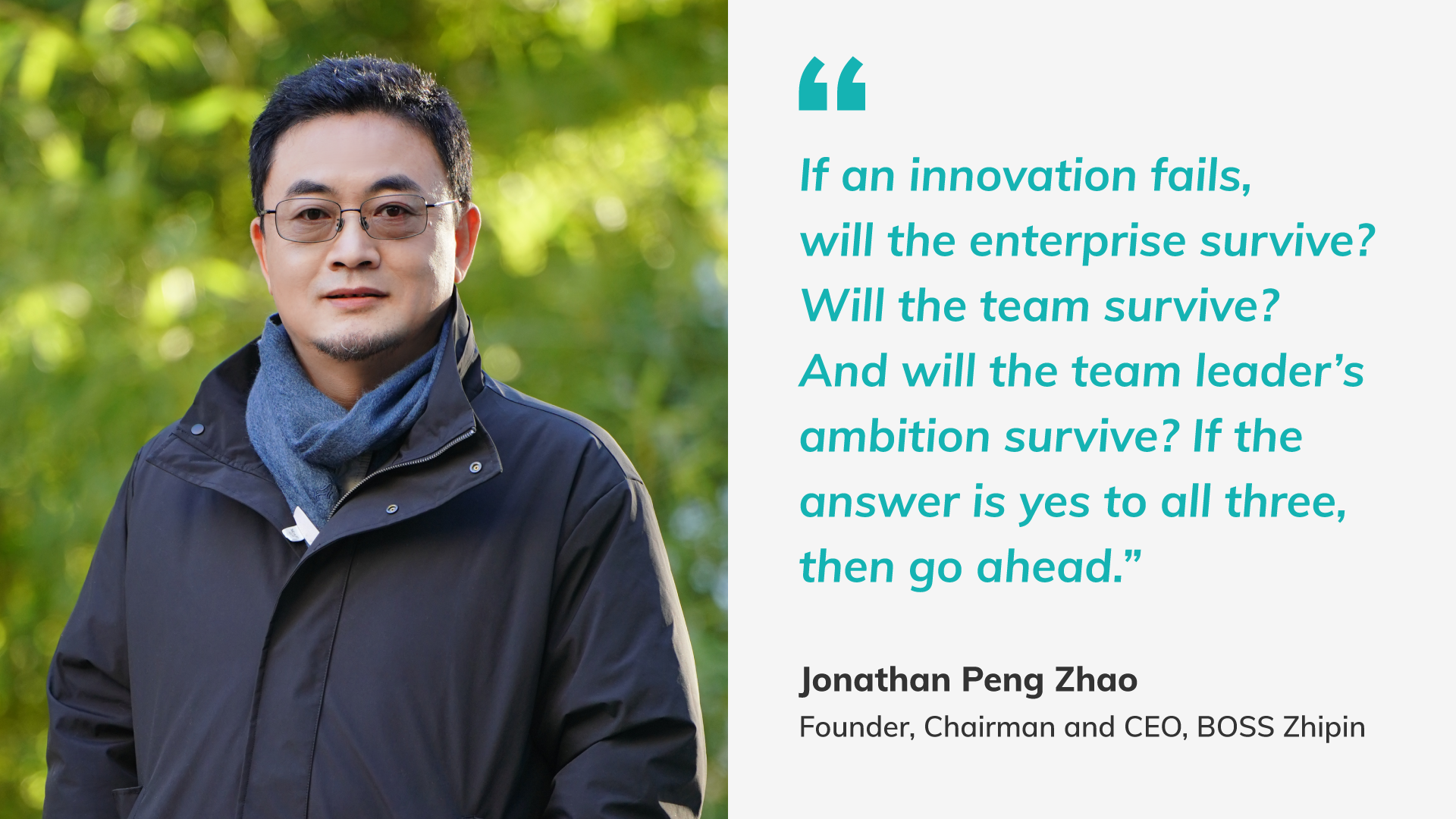BOSS Zhipin: The “New World” of the Recruitment Industry
Jonathan Peng Zhao, a widely recognized leader in the fields of human resources and the internet in China, delivered a speech at the ceremony celebrating the listing of BOSS Zhipin on NASDAQ on June 11, 2021.
BOSS Zhipin (Kanzhun Limited) is a rising star in the global online recruitment industry. Over the past decade, BOSS Zhipin has achieved remarkably rapid growth, making it one of the most valuable online platforms and attracting attention from prestigious enterprises and investment institutions that include Tencent, UBS and J.P. Morgan.
BOSS Zhipin is now the largest recruitment platform in China, serving over 46 million users with job-seeking or recruitment needs every month—a figure greater than the population of many countries. At the end of April 2024, the cumulative number of verified users served by BOSS Zhipin exceeded 190 million, with the cumulative number of verified enterprises surpassing 14 million.
Founder Jonathan Peng Zhao describes the development path of BOSS Zhipin as drawing insights from the tribal era and integrating the latest human technology to cultivate a completely new market. “Innovation is, in essence, leveraging modern technology and products to restore what should have been simple and more elegant. People like Steve Jobs mastered this,” he says.
Discovery of the “New World”
In 2023, BOSS Zhipin achieved revenue growth of 31.9%, reaching RMB5,952 million (US$838.3 million), even as many online recruitment platforms experienced stagnation or declining turnover in China and globally.
As of March 31, 2024, approximately 5.7 million enterprise customers across more than 3.5 million enterprises conducted paid recruitment activities on BOSS Zhipin during the preceding 12 months. Among new users, there is an influx of small and medium-sized enterprises (SMEs) venturing into paid online recruitment services for the first time. With over 50 million enterprises in China, BOSS Zhipin’s “New World” exploration has only just begun.
Zhao is a sci-fi enthusiast who has watched “Dune” three times and “The Three-Body Problem” eight times. Science fiction often encourages people to consider issues from a broader temporal and spatial perspective, leading them into an imaginative future without limits. In Zhao’s case, he contemplates his business model from the perspective of humanity’s origins.
He explains that “recruitment” existed even in the tribal era, when experienced hunters gathered groups of juniors to hunt together. Fast-forward to the modern era, and the “hunting” job has been divided into various tasks equivalent to bow and arrow manufacturing, pathfinding, tracking prey, etc. For each task, specialized talents are needed—drawing bows, shooting arrows or bagging the catch—and today’s requirements include university degrees, a background in geography or handcrafting experience.
The sophistication of modern labor division and today’s multifarious job requirements—necessary or not—can make life extremely difficult for “hunters” lacking a department dedicated to talent searching and matching. Resource-strapped enterprises, such as many SMEs, often give up on being part of this complex game, and when hiring a small number of employees, they instead opt for word-of-mouth or offline poster-style recruitment.
What if modern technology could take us back to the tribal age, and make the recruitment process as easy as the senior hunters gathering the young?
Suppose that modern algorithms can generate a list of well-matched and highly active candidates for recruiters. Then, all they need are online chats and interviews to find the right person.
Providing smart matching and direct chat functions since its inception, BOSS Zhipin has offered this user experience for 10 years. For this and other industry innovations, investors praise the company as highly responsive to humanity’s needs.
BOSS Zhipin’s simple, foolproof interaction interface enables SME owners, executives and department heads to easily engage in online recruitment services and reach more talent. These are the “senior hunters” seeking a helping hand—yet many have found themselves perplexed rather than aided by conventional online recruitment services.
No innovation, no future
Zhao thrives on creation and innovation.
Early in his career, he helped establish China’s first youth talent development program. He was also involved in launching a volunteer program for university students to support schooling in impoverished areas in Western China, and the program remains active today.
In 2018, Zhao pinpointed the World Cup as a marketing sweet spot—a strategy that his industry peers hadn’t chosen in the past. Thanks to the company’s bold marketing spending at that time, BOSS Zhipin has surged to become the largest Chinese online recruitment platform in terms of average monthly users.

Zhao believes that without innovation, startup companies may not survive, and he has developed several innovation theories. For example, he posits that innovation is never planned top-down, but emerges from a process similar to Brownian motion; innovation does not follow prescribed rules beyond the most basic ones.
“If an innovation fails, will the enterprise survive? Will the team survive? And will the team leader’s ambition survive? If the answer is yes to all three, then go ahead,” says Zhao.
Today’s main areas of innovative exploration are shifting from mobile internet and smart recommendations to artificial intelligence. Amid this technological wave of building AI applications and large language models (LLMs), Zhao affirms his investment. The company’s self-developed Nanbeige LLM has garnered globally excellent results in multiple international evaluations.
What really matters
One can almost say that destiny has interwoven Zhao’s career trajectory with the talent development industry. At different stages of his career, he has been involved in many key elements of the sector.
At the age of 43, Zhao decided to start his own company, and he continued to dive into online recruitment, embarking on a career path with great promise, yet requiring great patience.

In a letter to investors, Zhao wrote: “At work, people get to know each other, identify issues, and solve problems. At work, people are adjudicated by the environment and are stimulated by challenges. At work, people continue to explore the world, attain a sense of achievement, open their eyes, and enrich their spirits. Everyone who works hard deserves to be treated with courtesy and deserves to enjoy better services.”
It is universally understood that suitable employment is essential for every individual and every family. Zhao hopes that through his team’s efforts, more people will wake up in the morning happy to go to work.
Perhaps Zhao has already achieved this for himself. The company’s longstanding employees would tell you that he works at the office almost 365 days a year. On public holidays, he might dress more casually, or bring along his canine companion.
In his office, Zhao has a figurine of Scrat from “Ice Age” sitting on his bookshelf. He likes the squirrel character and considers it a reminder to himself: No matter what the surroundings are like—even if faced with icy adversity—one should chase their hazelnut as if it is the world’s last one, and never give up.
Zhao often inspires his team. “Rarely in human history has so much been owed by so many to so few—and having the job market well served is one of those instances,” he says, adapting Winston Churchill’s famous quote honoring the British Royal Air Force pilots who fought the Battle of Britain.
